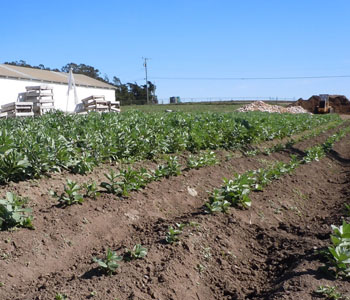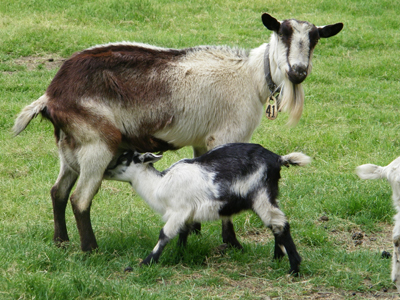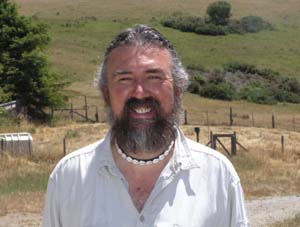Scholarships Grow Better Farms
Brie Mazurek, CUESA Staff
February 17, 2012
As part of our mission to cultivate a sustainable food system, CUESA offers scholarships for Ferry Plaza sellers to attend classes and conferences that will help them make their business more environmentally sound, socially just, humane, and economically viable. Two farms recently received scholarships to attend the EcoFarm Conference, which gathers together more than a thousand farmers, ranchers, students, and sustainability advocates for three days of learning on the Monterey coast. We talked with the scholarship recipients about how the experience will change what they’re doing on their farms.
Cultivating Young Farmers at Far West
 This was the first EcoFarm conference for Kyle Garrone, the son of Far West Fungi’s founders John and Toby, and Erin Raser, a horticulture student at Cabrillo College who is developing a vegetable farm on Far West’s eight-acre site. Kyle, who graduated from UC Davis two years ago with a degree in plant biology, manages the farm’s mushroom production. “I’m the scientist in the family,” he says.
This was the first EcoFarm conference for Kyle Garrone, the son of Far West Fungi’s founders John and Toby, and Erin Raser, a horticulture student at Cabrillo College who is developing a vegetable farm on Far West’s eight-acre site. Kyle, who graduated from UC Davis two years ago with a degree in plant biology, manages the farm’s mushroom production. “I’m the scientist in the family,” he says.
Kyle went to the conference looking for ways to make their certified organic operation even more ecologically sustainable. Far West faces a unique set of production challenges not encountered on most farms. Their mushrooms are grown in a climate-controlled environment, in blocks made of sawdust (recycled from a local furniture maker) and organic rice bran from Lundberg Family Farms. Instead of using chemicals, the farm controls contaminants by growing the mushrooms inside plastic bags with filter patches that allow for the passage of oxygen and carbon dioxide. “We use about 15,000 bags a week,” says Kyle. “They basically have to go in the trash because they’re made of propylene and have mycelium growing inside of them. We’ve been trying to find a way to recycle them, but no one’s been able to help us.”
At EcoFarm, Kyle attended a session on responsible packaging, where he was introduced to a company that recycles plastic used in agricultural production. “We spend thousands of dollars in garbage fees, so this could be a huge savings for us—and we won’t be sending all that plastic to a landfill,” he says.
Growing mushrooms in sawdust blocks also creates irrigation runoff problems, since the tannins in wood make the water so acidic that it cannot leave the Far West property. The Garrones have found some creative solutions: they use ponds to store the runoff and neutralize the pH, and since last fall, Erin has been raising an acre of field crops on the farm in order to put that water to use. She’s currently growing favas, peas, and native corn, and just planted 20 apple trees.
At EcoFarm, Erin learned about ecological pond design and Integrated Pest Management (IPM), both of which gave her ideas to implement on Far West’s site. “It was really inspirational,” she says. “I came home excited to plan more and talk with other people about what they’re doing on their farms.”
Better Grazing for Bodega & Yerba Santa
 For Javier Salmon of Bodega & Yerba Santa Goat Cheese, attending EcoFarm was an opportunity to build on his lifelong experiences in goat herding and cheese making, and deepen connections within the sustainable ag community. He learned about different grazing systems, which opened his eyes to new ways of working with his property in Lakeport, where he raises 126 goats on 20 acres of pasture using year-round rotational grazing. “Before, we were just resting the pasture for a month, and then putting the goats back in,” he says. “At EcoFarm, I learned that letting the pasture rest for longer periods of time improves the health and nutrient value of the pasture.” He is already planning to create additional grazing paddocks to allow for longer rotation periods.
For Javier Salmon of Bodega & Yerba Santa Goat Cheese, attending EcoFarm was an opportunity to build on his lifelong experiences in goat herding and cheese making, and deepen connections within the sustainable ag community. He learned about different grazing systems, which opened his eyes to new ways of working with his property in Lakeport, where he raises 126 goats on 20 acres of pasture using year-round rotational grazing. “Before, we were just resting the pasture for a month, and then putting the goats back in,” he says. “At EcoFarm, I learned that letting the pasture rest for longer periods of time improves the health and nutrient value of the pasture.” He is already planning to create additional grazing paddocks to allow for longer rotation periods.
Creating optimal nutrition for his herd is a high priority for Javier, who is currently caring for 86 very-soon-to-be mother goats. In addition to hay that is grown on the farm, the herd grazes on a diverse diet of native grasses, plus wild herbs such as mugwort and chamomile. At a workshop on holistic herd health, he learned about ways to improve his goats’ diets with supplements such as organic kelp, rye, and amaranth seeds, which have a high protein content and improve milk production as well as taste.
 In a workshop on livestock guardian dogs, Javier learned about “predator-friendly” ways of managing coyotes, mountain lions, and bobcats that prey on his baby goats. In particular, he was excited to hear about Maremma sheepdogs, a breed native to Italy, which are less prone to wandering than the Great Pyrenees he has had on his farm. He has plans to adopt a Maremma pup from a local breeder he met at EcoFarm.
In a workshop on livestock guardian dogs, Javier learned about “predator-friendly” ways of managing coyotes, mountain lions, and bobcats that prey on his baby goats. In particular, he was excited to hear about Maremma sheepdogs, a breed native to Italy, which are less prone to wandering than the Great Pyrenees he has had on his farm. He has plans to adopt a Maremma pup from a local breeder he met at EcoFarm.
Making useful connections with other farmers, goat ranchers, and cheese makers, Javier left in awe of the community he experienced at EcoFarm. “The energy was amazing,” he says. “It’s hard to explain in words, but it just feels really good to be there.”
Learn more about CUESA’s seller scholarship program here. Far West Fungi can be found at the Ferry Plaza Farmers Market every Saturday and at their storefront in the Ferry Building seven days a week. Bodega & Yerba Santa does not attend the market in the winter, but Javier aims to return to the Saturday market with fresh goat cheese by the end of March.
Topics: Animal welfare, Farmers, Programs
